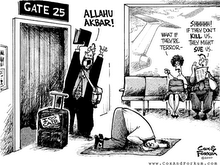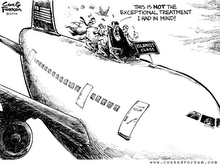A better-integrated Muslim population would better serve the United States as it navigates critical domestic and foreign-policy challenges involving Muslim populations, a new report argues.
Sponsored by the Chicago Council on Global Affairs, the report released Tuesday says that greater U.S. Muslim involvement in the public square is crucial to the nation's security and well-being, and that Muslims are largely responsible for finding ways to make themselves heard.
The report by a 32-member nationwide task force culled from academia, politics and the business and nonprofit worlds largely avoids sensitive questions about attitudes toward U.S. foreign and security policy.
"This is a group that is half-Muslim, half non-Muslim that came together because we believe that America is losing by not having the appropriate involvement of Muslim Americans in the civil discourse of politics," said task force co-chair Lynn Martin, a former Republican congresswoman and secretary of labor in the George H.W. Bush administration. "This is not whiny. This is not about what's wrong. What it says is, here are some potential solutions."
Among them: expanded counterterrorism partnerships between Muslim Americans and law enforcement, development of a leadership network of prominent Muslim Americans to work with youth and serve as "community ambassadors," building stronger Muslim American institutions and working with coalitions on common concerns like immigration and health care.
The report also calls on the media and government to fairly portray and involve Muslims in the national discourse, but suggests Muslims carry greater responsibility.
One of the American Muslim community's defining characteristics its diversity poses a challenge when identifying potential leaders and organizing, said Farooq Kathwari, another task force co-chair. Kathwari is chairman, president and chief executive officer of Ethan Allen Interiors Inc., one of the nation's largest furniture companies.
"It is not an easy situation for Muslim Americans because they are not one, they are not monolithic," he said. "The only reason now they're getting together like African-Americans got together is for civil rights."
The report maintains that a good foundation exists because most Muslims see no contradiction between their faith and American values and also makes clear the consequences of failure when tensions remain high over terrorism.
"The gathering climate of suspicion and mutual mistrust, exacerbated by the lack of engagement and dialogue, threatens to marginalize and alienate some Muslim Americans to the point where the danger of radicalization of a small minority could become a real possibility," the report says. "It would take only a single, significant act of terrorism in the United States involving Muslim Americans to cement the impression that rampant radicalism has taken root within the community."
The Chicago Council on Global Affairs is an independent, nonpartisan group that aims to influence discourse on global issues.
Tuesday, June 26, 2007
Integration vs. Rights
Subscribe to:
Post Comments (Atom)









No comments:
Post a Comment